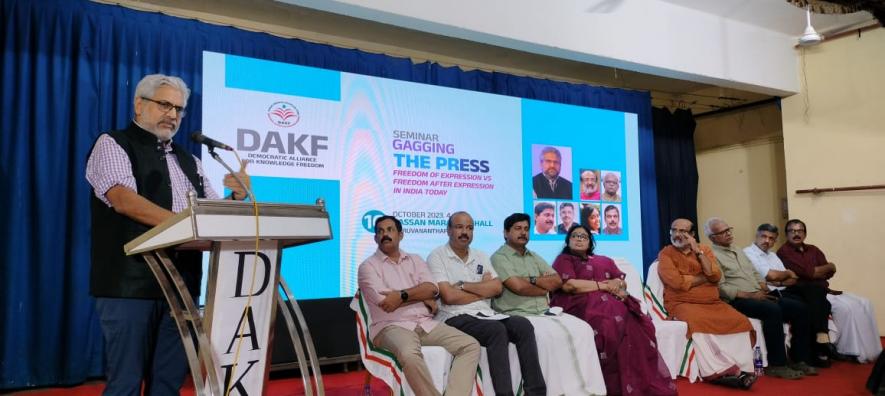NewsClick Attack ‘Sign of Steady Decline of Freedom’

The Wire co-founder-editor Siddharth Varadarajan addresses the seminar ‘Gagging the Press: Freedom of Expressions vs Freedom after Expression in India Today’ in Thiruvananthapuram on Monday.
Several journalists have termed the “attack” on NewsClick is a “sign of steady decline of freedom” guaranteed by the Constitution.
At a seminar titled ‘Gagging the Press: Freedom of Expressions vs Freedom after Expression in India Today’ organised by the Democratic Alliance for Knowledge Freedom in Thiruvananthapuram on Monday, the use of the Unlawful Activities (Prevention) Act (UAPA) and the colonial-era sedition law to silence the media and activists was flayed by the speakers.
The speakers raised concerns over the multiple attacks on media outlets by Central agencies and accused the Centre of resorting to post-publication censorship to instil fear and insecurity into the media since pre-publication censorship is now practically impossible.
The updated Information Technology Rules, 2023, were termed as “another law to empower the Centre through a few bureaucrats to decide what is fake news”.
Inaugurating the seminar, The Wire co-founder-editor Siddharth Varadarajan criticised the “multipronged attack by Central agencies, including the Enforcement Directorate and the Central Bureau of Investigation (CBI) against NewsClick”.
“I feel that things are worse than the Emergency. The Supreme Court (SC) has to assert itself since students and journalists charged under UAPA are spending years in jail with even High Courts reluctant to grant bail,” he said.
Rejecting the BJP’s claims that nothing comparable to the Emergency is happening now, Varadarajan said, “During the Emergency, the media was subjected to pre-censorship. How the authoritarian regime reacts now is through post-publication repression. Freedom after expression is a question in India, an effective method to terrorise journalists.”
Senior journalist KJ Jacob accused the Union government of “misusing” laws to “threaten political opponents and media outlets”.
“How is appreciating China and its achievements a crime if the organisation has done so when Article 19 of the Constitution has given us the right to express our opinion freely. The government’s action is nothing but imposition of silent censorship on what to speak and what not to speak,” he said.
Jocob also expressed concerns over the possibility of surveillance on not only journalists but also on the common man. “Such actions could lead to self-censorship, which is not good for a healthy democracy. There will be nobody left to say that the ‘King is Naked’,” he added.
Kerala’s former finance minister Thomas Isaac accused the BJP government of “attempting to silence the dissenting voices” in the political circle and the media organisations.
Digital media outlets were credited for speaking against government “repression” by the speakers, who claimed that most of the mainstream media is “serving the government’s interest”.
“Even we received notices from the lieutenant governor of Jammu and Kashmir for reporting on allegations relating to the insurance scheme implemented there. The Editors Guild of India had to approach the SC for seeking protection against arrest for finding facts in Manipur. These are measures to prevent people from reporting on crucial things,” Varadarajan said.
He also elaborated the threat of surveillance or raids being used against individuals, film personalities, cartoonists and others depending on what they speak, write and produce.
“Certain kinds of expressions are given complete freedom and even tax exemptions, including the Kashmir Files and The Kerala Story. But Punjab 95, based on Jaswant Singh Khalra, was denied permission for screening. Students, teachers, authors and others face the uncertainty over freedom after expression. It is high time such opposition is widespread and sustained,” Varadaraj added.
M G Radhakrishnan, another senior journalist who addressed the seminar, the government’s actions in capturing, controlling and silencing the media.
“They have raided media organisations, including BBC, NewsClick and The Wire, which is a direct attack on these organisations. They adopt indirect methods like using anti-democratic laws to silence them. And most recently, we saw NDTV being taken over, instilling fear among their journalists and making them work in their [government] favour,” he added.
Get the latest reports & analysis with people's perspective on Protests, movements & deep analytical videos, discussions of the current affairs in your Telegram app. Subscribe to NewsClick's Telegram channel & get Real-Time updates on stories, as they get published on our website.
























